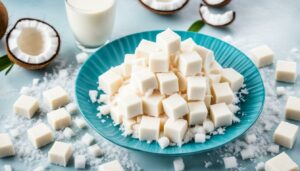Originally posted on January 9, 2024 @ 5:50 am
White sugar is a common ingredient in many recipes, but if you’re looking for healthier alternatives, there are several options available. By substituting white sugar with natural sweeteners or sugar substitutes, you can still enjoy delicious sweet treats while reducing your intake of refined sugar. In this article, we will explore 12 different substitutes for white sugar and explain how to use them in your cooking and baking recipes.
Contents
- 1 Honey
- 2 Stevia: A Sweet and Healthy Sugar Substitute
- 3 Coconut sugar
- 4 Palm sugar
- 5 Maple Syrup: A Natural and Versatile Sweetener
- 6 Erythritol
- 7 Xylitol
- 8 Dates
- 9 Conclusion
- 10 FAQ
- 10.1 What can I substitute for white sugar in a recipe?
- 10.2 What are sugar substitutes?
- 10.3 What are natural sweeteners?
- 10.4 Are there any healthy sugar alternatives?
- 10.5 Can I replace white sugar in baking?
- 10.6 What are some low sugar baking substitutes?
- 10.7 Can I use sweetener replacements in all recipes?
- 10.8 What are some sugar-free sweeteners?
- 11 Source Links
Key Takeaways:
- There are many alternatives to white sugar that can be used in cooking and baking recipes.
- Honey, stevia, coconut sugar, and other natural sweeteners provide a healthier option without sacrificing flavor.
- Experiment with different substitutes to find your favorite and enjoy the benefits of reducing your consumption of refined sugar.
- Remember to use these substitutes in moderation and adjust recipe measurements accordingly.
- By making these small changes, you can create delicious and healthier treats for yourself and your loved ones.
Honey

Honey, the golden elixir, has been used as a natural sweetener for centuries. It is created by bees from the nectar of flowers and comes in various flavors and colors depending on the plant source. Raw honey, in particular, offers a range of health benefits that set it apart from regular sugar.
Raw honey is not only a delicious alternative to sugar in recipes, but it also has numerous health benefits.
| Benefits of Honey |
|---|
| Immune-boosting properties |
| Allergy relief |
Raw honey has natural antibacterial and antifungal properties and can help support the immune system. It is also believed to provide relief for seasonal allergies due to its trace amounts of pollen. Moreover, honey’s antioxidants and anti-inflammatory properties make it a beneficial addition to your diet.
When using honey as a substitute for sugar in your recipes, keep in mind that it is sweeter in taste. Therefore, you will generally need to use less honey compared to the amount of sugar called for in a recipe. Experimenting with honey as a sweetener can lead to unique and flavorful creations in your kitchen.
To sum up, honey is not only a natural and delicious sweetener, but it also brings additional health benefits to the table. Its immune-boosting properties and allergy relief make it an excellent choice for those looking to reduce their refined sugar intake while enjoying the goodness and flavor of a natural alternative.
Stevia: A Sweet and Healthy Sugar Substitute

If you’re looking for a natural sugar substitute with no calories and a low glycemic index, stevia is an excellent choice. Derived from the stevia plant, this plant-based sweetener offers a significantly sweeter taste than sugar, allowing you to use smaller amounts while still enjoying the same level of sweetness in your recipes.
One of the remarkable advantages of stevia is its lack of calories, making it an attractive option for those watching their weight or looking to reduce their overall calorie intake. Additionally, stevia has a low glycemic index, meaning it does not cause a rapid spike in blood sugar levels like regular sugar does. This makes it a fantastic alternative for individuals with diabetes or those trying to manage their blood sugar levels.
Stevia is a versatile sweetener that can be used in various cooking and baking recipes, as well as for sweetening beverages. It is heat stable, allowing you to use it in hot beverages, sauces, and even your favorite baked goods. Whether you’re making a stevia-sweetened lemonade or adding it to your morning coffee, stevia is a convenient and healthy way to satisfy your sweet tooth.
With its natural origin, no calories, and low glycemic index, stevia offers a guilt-free way to enjoy sweetness in your favorite recipes. Experiment with stevia as a sugar substitute and discover a whole new world of flavorful and healthy possibilities.
“Stevia: a guilt-free way to enjoy sweetness in your favorite recipes”
- Stevia-sweetened chocolate chip cookies
- Stevia-infused vanilla ice cream
- Stevia-spiked strawberry lemonade
- Stevia-laced oatmeal raisin muffins
Coconut sugar

Coconut sugar, derived from the nectar of coconut palm flowers, is a popular alternative to white sugar. Not only does it offer a sweet taste, but it also comes with several health benefits. One notable advantage of coconut sugar is its low glycemic index, which means it has a slower impact on blood sugar levels compared to white sugar. This makes it a suitable option for those who need to manage their blood sugar levels.
In addition to its low glycemic index, coconut sugar also contains various minerals, including potassium, magnesium, iron, and zinc. These minerals provide added nutritional value compared to white sugar. Furthermore, coconut sugar has a delightful caramel flavor that adds a unique taste to your dishes and baked goods.
You can easily substitute coconut sugar for white sugar in a 1-to-1 ratio, making it a convenient option for recipes. Whether you’re making cookies, cakes, or beverages, coconut sugar can enhance the flavor profile while offering a healthier alternative. So why not give it a try in your next recipe and experience the delicious taste and benefits of this natural sweetener?
Key Points:
- Coconut sugar has a lower glycemic index than white sugar.
- It contains minerals like potassium, magnesium, iron, and zinc.
- The caramel flavor of coconut sugar adds a unique taste to dishes.
- You can substitute coconut sugar for white sugar in a 1-to-1 ratio.
Palm sugar

Palm sugar, also known as jaggery or piloncillo, is an unrefined sugar made from sugar cane or palm. It is a healthier alternative to white sugar as it undergoes minimal processing, retaining its natural nutrients. Unlike white sugar, which goes through a refining process that removes minerals, palm sugar is rich in minerals such as potassium, iron, and calcium.
One of the distinctive qualities of palm sugar is its caramel flavor, which adds a depth of sweetness to dishes. Whether you’re making desserts or savory dishes, palm sugar can be a versatile and flavorful substitute for white sugar.
Here is a table that highlights the nutritional content of palm sugar in comparison to white sugar:
| Nutrient | Palm Sugar (per 100g) | White Sugar (per 100g) |
|---|---|---|
| Calories | 380 | 387 |
| Carbohydrates | 92g | 100g |
| Potassium | 650mg | 2mg |
| Iron | 13mg | 0.01mg |
| Calcium | 85mg | 1mg |
As you can see, palm sugar is not only a flavorful sweetener but also a rich source of important minerals. Its lower glycemic index compared to white sugar makes it a suitable choice for those watching their blood sugar levels.
Maple Syrup: A Natural and Versatile Sweetener

Maple syrup is a delicious and healthy alternative to white sugar in cooking and baking. Made from the sap of maple trees, it offers a unique flavor profile that adds depth and richness to your recipes. Not only does it provide a great taste, but it also offers several health benefits.
One of the advantages of using maple syrup as a natural sweetener is its heat stability. Unlike some other sweeteners, maple syrup retains its flavor and properties when exposed to high temperatures. This makes it an excellent choice for various cooking techniques, such as glazing, roasting, or grilling. Whether you’re preparing a savory dish or a sweet dessert, maple syrup can enhance the flavors and provide a touch of natural sweetness.
Another reason to choose maple syrup is its relatively lower glycemic index compared to white sugar. This means that it has a slower impact on blood sugar levels, making it a better option for those who need to manage their blood sugar. Additionally, it contains essential minerals like manganese and zinc, which contribute to a balanced diet.
When substituting maple syrup for white sugar in recipes, you’ll need about half to three-quarters of a cup of maple syrup for every cup of white sugar. Keep in mind that maple syrup is sweeter than sugar, so you may need to adjust the amount of liquid in your recipe to maintain the desired consistency.
Experience the great flavor and versatility of maple syrup in your favorite dishes. Whether you’re baking maple-infused cookies, drizzling it over pancakes, or using it as a glaze for roasted vegetables, maple syrup adds a delicious touch of sweetness and depth to your culinary creations.
Erythritol

Erythritol is a popular substitute for white sugar due to its unique properties and benefits. As a sugar alcohol, erythritol is calorie-free and does not affect blood sugar levels, making it an excellent choice for those watching their calorie intake or managing diabetes.
Erythritol has a taste and appearance similar to sugar, making it a seamless swap in your favorite recipes. It can be used in equal amounts as a 1-to-1 replacement for sugar, allowing you to enjoy your favorite sweet treats without the guilt.
One of the advantages of erythritol is its hygroscopic nature. It has the ability to hold water molecules, which can help retain moisture in baked goods. This makes erythritol a great option for creating delicious and moist cakes, cookies, and bread.
However, it’s important to note that erythritol does have limitations. Unlike sugar, it cannot activate yeast in bread dough, which can affect the texture of certain baked goods. If you’re looking to create yeast-based recipes, it’s best to use a different sugar substitute or a combination of erythritol and another suitable ingredient.
Erythritol is a versatile and calorie-free substitute for white sugar. Its hygroscopic nature makes it an excellent choice for baking, providing moisture and sweetness to your favorite treats. Incorporate erythritol into your recipes and enjoy the benefits of a healthier, sugar-free lifestyle.
Xylitol

Xylitol is a sugar alcohol that offers a sweet taste with fewer calories than regular sugar. It is a popular choice for individuals looking to reduce their calorie intake without sacrificing the sweetness in their recipes. Xylitol also has the added benefit of not causing a spike in blood sugar levels, making it a suitable option for those with diabetes or anyone monitoring their blood sugar.
One of the notable advantages of xylitol is its role in tooth decay prevention. Unlike regular sugar, xylitol does not contribute to the growth of harmful bacteria in the mouth, reducing the risk of cavities and promoting better oral health.
It is important to note that while xylitol can be used in most recipes, it is not suitable for those that require yeast activation. Additionally, it is crucial to keep xylitol away from pets, as it can be toxic to dogs.
Explore the possibilities of xylitol in your baking and cooking endeavors to enjoy a sweet taste with reduced calories and tooth decay prevention.
| Benefits of Xylitol | Drawbacks of Xylitol |
|---|---|
|
|
Dates
Dates are a delicious and nutritious natural sweetener that can be used in a variety of recipes. They have been enjoyed for centuries and are known for their sweet taste and chewy texture. Apart from being a great alternative to white sugar, dates offer a range of health benefits.
One of the key advantages of using dates as a natural sweetener is their high fiber content. Fiber is essential for maintaining good digestive health and promoting satiety. Dates are also packed with essential nutrients, including potassium, magnesium, and vitamin B6.
When used in recipes, dates can be either made into a paste or chopped and added directly. They add a rich, caramel-like flavor and moisture to baked goods, making them a popular choice for sweet treats.
In addition to using whole dates, there are also alternative options available such as date syrup and date sugar. These products are made from processed dates and can be used in a similar way to honey or other liquid sweeteners.
Overall, dates are a versatile and nutritious natural sweetener that can enhance the flavor and nutritional profile of your recipes. Explore different ways to incorporate dates into your cooking and baking to enjoy their unique taste and health benefits.
| Natural Sweetener | Benefits | Usage |
|---|---|---|
| Honey | Rich flavor, health benefits | Can be used in various recipes |
| Stevia | No calories, low glycemic index | Heat stable, suitable for cooking and baking |
| Coconut sugar | Low glycemic index, mineral content | Substitute for white sugar in a 1-to-1 ratio |
| Palm sugar | Unrefined, rich caramel flavor | Can be used in most recipes |
| Maple syrup | Natural, great flavor | Heat stable, versatile option for cooking and baking |
| Erythritol | Calorie-free, tooth-friendly | Hygroscopic, suitable for baked goods |
| Xylitol | Fewer calories, prevents tooth decay | Not suitable for recipes requiring yeast |
| Dates | High fiber content, nutrients | Can be used as a paste or chopped |
Conclusion
In summary, there are numerous alternatives to white sugar that can enhance your cooking and baking recipes. By replacing white sugar with natural sweeteners like honey, stevia, coconut sugar, and others, you can still enjoy delicious treats while reducing your consumption of refined sugar. These alternative sweeteners offer a healthier option without compromising on flavor.
It’s important to experiment with different substitutes to find your favorite and adjust the recipe measurements accordingly. Remember to use these alternatives in moderation, as they still contain calories. By making these small changes, you can create mouthwatering and healthier treats for yourself and your loved ones.
In final thoughts, incorporating these sugar substitutes into your culinary repertoire can contribute to a balanced diet and better overall health. Embrace the variety and benefits of these natural sweeteners, and say goodbye to excessive refined sugar. Your taste buds and body will thank you!
FAQ
What can I substitute for white sugar in a recipe?
There are several alternatives to white sugar that you can use in recipes. Some popular options include honey, stevia, coconut sugar, palm sugar, maple syrup, erythritol, xylitol, and dates.
What are sugar substitutes?
Sugar substitutes are sweeteners that can be used as alternatives to white sugar. They are often lower in calories, have different flavors, and may have different effects on blood sugar levels.
What are natural sweeteners?
Natural sweeteners are sweeteners derived from natural sources such as plants or fruits. Examples include honey, stevia, coconut sugar, palm sugar, and maple syrup.
Are there any healthy sugar alternatives?
Yes, there are several healthy sugar alternatives available. Natural sweeteners like honey, stevia, and maple syrup provide sweetness with additional health benefits. Sugar alcohols like erythritol and xylitol are also popular options.
Can I replace white sugar in baking?
Yes, you can replace white sugar in baking recipes with alternatives like honey, stevia, coconut sugar, palm sugar, maple syrup, erythritol, xylitol, or dates. The exact replacement amount may vary, so it’s best to refer to specific conversion guides or experiment with different amounts.
What are some low sugar baking substitutes?
Some low sugar baking substitutes include stevia, erythritol, xylitol, and natural sweeteners like honey, coconut sugar, palm sugar, and maple syrup. These alternatives can help reduce the overall sugar content in your baked goods.
Can I use sweetener replacements in all recipes?
Sweetener replacements like honey, stevia, coconut sugar, palm sugar, maple syrup, erythritol, xylitol, and dates can be used in most recipes. However, it’s important to note that some substitutions may alter the texture or taste of the final product, so you may need to make adjustments accordingly.
What are some sugar-free sweeteners?
Sugar-free sweeteners include stevia, erythritol, xylitol, and some artificial sweeteners. These sweeteners do not contain any or contain very few calories and do not impact blood sugar levels.








